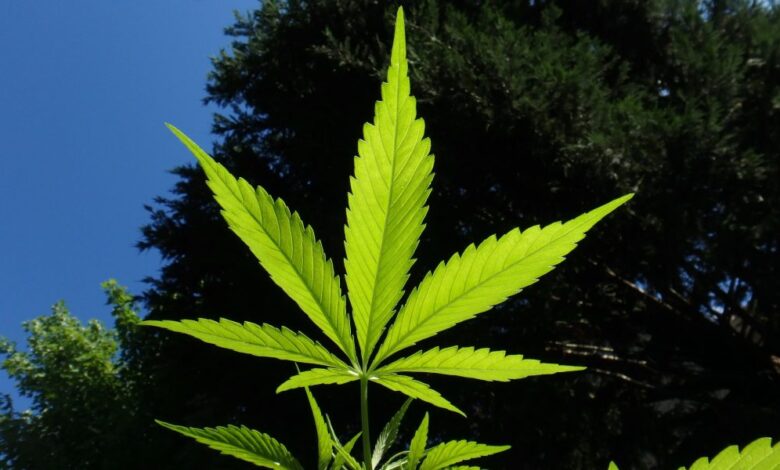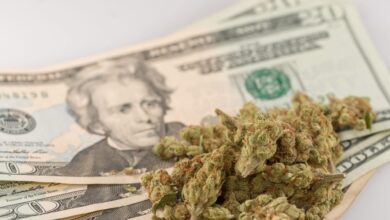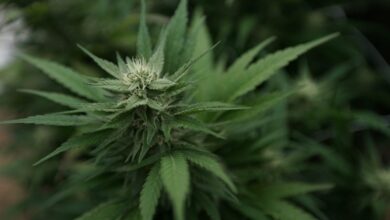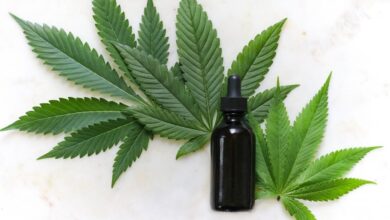Hawaii Marijuana Legalization Bill Gets Approval From House Committees At Joint Hearing

A sweeping invoice to legalize adult-use marijuana in Hawaii and produce collectively hemp and hashish regulation beneath a single company superior on Tuesday, successful approval from a pair of Home committees at a joint listening to.
The measure—HB 1246, from Rep. David Tarnas (D)—was heard at a gathering of the Committee on Judiciary and Hawaiian Affairs and the Committee on Agriculture and Meals Programs. The our bodies voted 6–4 and 5–0, respectively, to advance the proposal.
“It is a one-plant strategy in order that it will beneath this workplace regulate medical hashish, adult-use hashish and hemp merchandise which are for consumption or use on the pores and skin by people. It might not embrace industrial hemp for development or for fabric,” Tarnas, who chairs the Judiciary and Hawaiian Affairs Committee, mentioned on the listening to.
He additionally emphasised that the laws has “protections towards the multi-state operators from coming into Hawaii” in an effort to bolster native companies as an alternative of making alternatives for big firms from elsewhere to dominate the market as has occurred in different states.
“The invoice features a five-year residency requirement, which is able to restrict who will be licensed and forestall these out-of-state firms from acquiring licenses,” Tarnas mentioned.
Public remark forward of the vote demonstrated what Tarnas acknowledged had been divided opinions on the proposed change.
“Now we have acquired testimony—95 in assist, 135 in opposition and feedback from 11,” the sponsor mentioned. “So you may inform, that is actually in some ways a divisive subject. It’s obtained individuals with sturdy emotions on each side.”
If enacted, the laws would set up the Hawaii Hashish and Hemp Workplace, which might oversee adult-use hashish, medical marijuana and hemp companies. Adults 21 and older would be capable of possess as much as an oz. of marijuana and 5 grams of hashish focus starting January 1, 2026. Adults may additionally develop restricted quantities of marijuana at dwelling for private use.
A companion invoice within the Senate, SB 1613, has been launched by Well being and Human Providers Committee Chair Sen. Pleasure San Buenaventura (D).
The brand new proposal comes after lawmakers final yr fell in need of passing a legalization invoice. The Senate permitted permitted that measure final March, however, as with previous efforts to finish prohibition, it stalled out within the Home of Representatives.
Forward of Tuesday’s listening to, the panels acquired almost 300 pages of testimony, together with from state businesses, advocacy organizations and members of the general public.
Lots of the public businesses that submitted feedback didn’t take an general place on the invoice, as an alternative providing suggestions on particular person provisions. Some company officers additionally requested a delayed efficient date on the invoice with a purpose to put together for the authorized change.
Nadine Ando, director of the Division of Commerce and Client Affairs, for instance, mentioned the invoice’s “dedication to public well being protections, together with an intensive public well being and training marketing campaign, displays a accountable strategy to mitigate potential dangers related to hashish use,” added that the division “additionally helps the intent to ascertain a zero-tolerance coverage towards distributing hashish to people beneath the age of twenty-one and driving beneath the affect of hashish.”
The Division of the Lawyer Basic, in the meantime, advised adjustments to the invoice’s provisions on open containers in automobiles. As launched, the invoice would prohibit open hashish packages in a shifting car until they had been saved in a trunk or different compartment out of the driving force’s attain. The AG’s workplace mentioned the “out of attain of the driving force” exception “would make enforcement of the open container legislation tough, as a driver can simply move any open hashish container, joint, or pipe, to their passenger or in any other case transfer it out of attain after a site visitors cease, however earlier than the officer reaches the automobile.”
The workplace advised as an alternative that the measure prohibit all open containers until explicitly “saved in a trunk, baggage compartment, or related container.”
The Division of the Lawyer Basic additionally really useful that along with authorized penalties for minors in possession of marijuana, in addition they be referred to an evaluation by a substance abuse counselor and doubtlessly required to acquire therapy for substance use dysfunction.
Luis Salaveria, director of the Division of Price range and Finance, mentioned the company “recommends that the tax on hashish merchandise be set at a parity to, if not larger than, different ‘sin’ taxes, with a portion of revenues deposited to the overall fund to assist the intensive authorized, regulatory, and grant-issuing framework proposed by this invoice in a self-sustaining matter.”
He wrote that projected hashish tax income for fiscal yr 2026 can be $4.4 million, rising to an estimated $17 million in fiscal 2027, including that “it’s tough to find out” whether or not the invoice’s proposed Hashish Regulation and Enforcement Particular Fund “shall be self-sustaining.”
Slaveria concluded, nevertheless, that the Division of Price range and Finance defers to different businesses as to “the programmatic deserves of this invoice.”
The Division of Agriculture, for its half, mentioned it “helps the ‘one-plant’ strategy” and “believes that this invoice gives substantial safety for hemp farmers and can assist the hemp business into the longer term,” although it really useful adjustments round importation and inter-island switch of hashish crops. One suggestion, for instance, is that the state’s legislation towards shifting wildlife from one island to a different not apply to hashish and hemp.
The Division of Well being mentioned that whereas it “appreciates {that a} precedence of HB1246 is the implementation of intensive, well-funded public well being protections,” it however expects that legalizing adult-use marijuana would “have a unfavorable influence on the well being of the general public,” warning of suicidal ideation, elevated threat of psychotic issues similar to schizophrenia and issues about exposing fetuses and newborns to hashish.
The well being division did, nevertheless, say it “strongly helps the ‘one plant, one regulatory company’ greatest follow” embodied within the invoice, and it expressed appreciation for its “intent to deal with inequalities by bringing financial alternative to deprived areas of Hawaii and transition illicit operators to the authorized market by a sturdy social fairness grant and charge waiver program.”
Teams that formally opposed the measures in public testimony included legislation enforcement—such because the Honolulu Police Division and the prosecuting attorneys’ workplaces in Honolulu and Maui—in addition to anti-drug teams, together with the Hawaii Substance Abuse Coalition and the Hawai’i Household Discussion board.
Some others, such because the Hawaiian Islands Republican Girls, mentioned they assist the medical use of marijuana however not its nonmedical use.
Amongst these in assist had been the Stonewall Caucus of the state Democratic Get together—which mentioned the invoice “represents an important step ahead towards modernizing our state’s hashish legal guidelines, supporting financial progress, and addressing long-standing problems with social fairness and felony justice reform”—in addition to the occasion’s training caucus.
Drug reform teams had been broadly supportive of the invoice—together with some that withheld assist for final yr’s invoice.
Marijuana Coverage Challenge (MPP), for instance, submitted feedback on final yr’s proposal however didn’t endorse the measure. This yr’s revised model, nevertheless, received the group’s assist, wrote Karen O’Keefe, MPP’s director of state insurance policies.
“We urge you to report HB 1246 favorably in order that Hawai’i can be part of the 24 different states which have legalized hashish for adults 21 years of age and older,” O’Keefe mentioned in submitted testimony, urging lawmakers to undertake amendments that will additional prioritize legacy operators.
She additionally mentioned that the invoice “would offer customers with a safer different to each illicit hashish and potent ‘fuel station hashish’ that’s widespread in Hawai’i now.”
“It mandates guidelines on lab testing, sanitation, well being and security, labeling, dosages, and efficiency, and requires packaging to be opaque, a single shade with no graphics, child-resistant, and resealable. It requires warnings on the merchandise and on flyers in hashish shops, and bans hazardous and detrimental merchandise,” her feedback mentioned, additionally emphasizing that youth use of marijuana has decreased in most states that legalized hashish.
As for final yr’s invoice, O’Keefe informed Marijuana Second earlier this yr that she had blended emotions about that proposal, which many noticed as over-regulated. Based mostly on a draft from the state lawyer normal’s workplace, the invoice “had a whole lot of language that we thought-about too authoritarian, too restrictive,” she defined, noting that in some instances—similar to a non-impaired driver who however had measurable THC of their system—the proposal would have truly elevated felony penalties.
The group Docs for Drug Coverage Reform additionally testified in assist of the brand new invoice, writing that “probably the most vital detriment of hashish lies within the extreme penalties of arrests or imprisonment, profoundly impacting each particular person and societal well-being.”
“The ramifications of a cannabis-related arrest or conviction can endure a lifetime,” the group mentioned, “hindering employment prospects, entry to monetary assets like automobile loans or mortgages, eligibility for scholar monetary support, and securing public housing.”
Nikos Leverenz, board president of the Drug Coverage Discussion board of Hawai’i, additionally submitted feedback in favor of the measure. In a subsequent assertion to Marijuana Second about Tuesday’s votes, Leverenz mentioned the committees “superior a invoice that could be a vital enchancment over final yr’s car.”
“The provisions for social fairness and craft hashish licenses are particularly salutary,” he mentioned. “HB 1246 lays a measured but sturdy regulatory basis for Hawaii to maneuver past the decades-long failure of criminalization that also ensnares far too many within the felony authorized system. Those that are criminalized embrace kids, with Native Hawaiian and Pasifika households disproportionately impacted.
“Legalization of adult-use might help present the form of science-based training and prevention packages in our communities to scale back using alcohol and different medicine and in addition assist forestall violence,” Leverenz added.
As for the possibilities of passage, the advocate famous that Gov. Josh Inexperienced (D) and the state Senate assist legalization. “As such, the Home has a chance within the coming weeks to create a hashish financial sector that may create new jobs and companies to profit our state within the close to time period. Ought to the federal authorities quickly open the gate to interstate commerce, this invoice will place Hawaii to compete within the nationwide market as an alternative of getting steamrolled by massive company pursuits from the continent,” he mentioned.
Earlier than voting to approve the laws, the joint committees adopted quite a lot of amendments, together with including a faulty date, which is a procedural technique of making certain that the laws receives extra dialogue earlier than being enacted.
Lawmakers additionally blanked out the appropriations provisions and people regarding the creation of recent state positions, leaving it to later committees to deal with these points.
Tarnas additionally mentioned the panels had been adopting really useful amendments from the lawyer normal, Division of Human Useful resource Growth, Division of Taxation and Hawai’i Alliance for Hashish Reform.
Extra adjustments concern using medical hashish in scholar housing at schools and universities, enterprise software necessities for present medical marijuana operators and THC quantities in hashish tinctures.
Right here’s what the laws, HB 1246 / SB 1613, would do:
- Set up the Hawaii Hashish and Hemp Workplace, which might regulate adult-use hashish, medical marijuana and hemp companies. The workplace can be housed throughout the Division of Commerce and Client Affairs and charged with prioritizing public well being and security.
- Regulators would promulgate guidelines for the state hashish system, license companies, register sufferers, preserve a seed-to-sale monitoring system and publish research and reviews on varied components of this system.
- Interim guidelines can be due by December 31, 2025, with ultimate guidelines to be adopted by December 31, 2030.
- An 11-person advisory board would research points round federal legislation, affected person entry, fairness and different issues, making suggestions to lawmakers and regulators. Members would come with representatives of the hemp and marijuana industries, agriculture, public well being and security, Native Hawaiian tradition, psychological well being and substance abuse therapy.
- As of January 1, 2026, adults 21 and older may possess as much as an oz. of marijuana and 5 grams of hashish focus.
- As of January 1, 2026, adults may additionally develop as much as six crops for private use and retailer as much as 10 ounces of homegrown hashish of their residence. Households with a number of adults can be restricted to a complete of 10 crops and two kilos of homegrown hashish.
- Gross sales of adult-use hashish can be taxed at 14 %, whereas the medical marijuana tax price would stay at 4 %.
- After the prices of administering this system, 30 % of state income would go to a social fairness grants program. A public well being and training grants program would obtain 10 %, as would a separate public security grant program. 5 % every would go to a hemp grants program, to counties, to the lawyer normal’s workplace for nuisance abatement and to counter cash laundering and arranged crime.
- Artificial or “artificially derived” cannabinoid merchandise can be restricted.
- Edibles couldn’t resemble sweet or different merchandise geared toward kids, nor may they appear like individuals, animals, fruit or cartoons.
- Packaging couldn’t embrace graphics, footage or a number of colours. Medical marijuana particularly would should be in white packaging.
- Labels would want to incorporate a common hashish image.
- Cultivation couldn’t happen in federal public housing, shelters, on-campus housing or accommodations, amongst different areas, and it might be prohibited by landlords and owners associations.
- Landlords may prohibit smoking or vaping marijuana however normally couldn’t ban individuals from possessing non-inhaled hashish merchandise.
- Smoking marijuana in public can be a civil violation, with penalties of as much as $130 or 10 hours of neighborhood service
- Driving beneath the affect of marijuana would stay against the law. A brand new penalty would additionally punish a passenger discovered smoking or vaping with a petty misdemeanor, carrying a advantageous of as much as $2,000.
- Except saved in a car’s trunk or different place out of attain of the driving force, an open container can be punished by a advantageous of as much as $130 or as much as 10 hours of neighborhood service.
- Promoting hashish to minors can be a misdemeanor.
- Diverting marijuana from a licensed enterprise to the unregulated market can be a Class C felony.
- Unlicensed extraction of hashish utilizing butane can be a Class C felony.
- Minors possessing as much as 5 grams of hashish focus might be charged with a petty misdemeanor, as may adults in possession of greater than 5 grams of focus.
- State and native authorities workers normally couldn’t be fired for utilizing medical or adult-use hashish away from work or for testing optimistic marijuana metabolites. Staff topic to federal necessities wouldn’t qualify for such protections, and exceptions may apply within the case of collective bargaining agreements.
- Regulators would license cultivators, processors, retailers, smaller-scale craft dispensaries and unbiased testing laboratories. Craft dispensaries may promote solely their very own hashish merchandise.
- The primary spherical of licenses beneath the legislation can be issued by July 1, 2026, although dual-use licenses permitting medical marijuana companies to serve adult-use prospects can be issued by January 1, 2026.
- Licenses can be awarded based mostly on a randomized lottery supplied candidates meet sure minimal requirements and {qualifications}. Participation by small companies, Indigenous farmers and folks from areas disproportionately impacted by the drug ware can be inspired.
- No individual may have an curiosity in additional than 9 licenses, as much as three per license class.
- Folks with an curiosity in an unbiased testing lab couldn’t have an curiosity in some other hashish enterprise.
- Folks with an curiosity in a small-scale cooperative or craft dispensary couldn’t have an curiosity in a enterprise of some other license kind.
- All license candidates would should be residents of Hawaii for a minimum of 5 years and couldn’t have any felony convictions apart from for cannabis-related offenses, pardoned or expunged offenses or sentences accomplished greater than 10 years earlier.
- Regulators may craft guidelines to permit particular occasion permits, social consumption and sure different actions.
- Medical marijuana dispensaries may transition to dual-use (medical and leisure) retail services. Conversion would price $50,000 per retail location and $25,000 for every manufacturing facility.
- State-registered sufferers and caregivers may possess as much as 4 ounces of marijuana. They might additionally develop as much as 10 crops and possess as much as a pound every of homegrown hashish for private use, with a most of two kilos per family.
- State regulators would license medical marijuana co-ops of as much as 5 sufferers.
- Rules would come with guidelines round safety, well being and security, promoting and labeling, power and environmental requirements, worker coaching and varied different issues.
- All workers of hashish companies would should be a minimum of 21 years of age. Nobody beneath 21 may enter retail shops.
- Companies would should be a minimum of 750 ft from faculties, parks and public housing complexes.
- Cultivators can be restricted to three,500 sq. ft of indoor cover house and 5,000 sq. ft of outside develop house.
- Handouts would should be included with all offered merchandise. They would want to incorporate quite a lot of data, together with directions, warnings about secure use, potential opposed results and the standing of federal legislation—together with how the battle with federal prohibition impacts gun rights, employment and different rights and advantages.
- Pesticide use on hashish merchandise can be regulated by the state Division of Agriculture.
- Hemp companies may promote cured hashish flower supplied it meets U.S. Division of Agriculture compliance requirements and state guidelines round testing, packaging and labeling.
- Aerosol hemp sprays can be prohibited.
- Hemp cultivation can be prohibited inside 300 ft of faculties, childcare facilities or playgrounds and will additionally not be inside 100 ft of a residence not owned by the licensee.
- With regard to hemp, regulators may prohibit particular cannabinoid merchandise. Hemp tinctures may include not more than 30 milligrams of THC per bundle and will solely be offered to adults 21 and older.
- A social fairness grants program would help candidates who’d resided in a disproportionately impacted space for a minimum of 5 of the previous 10 years or companies with greater than half of workers residing in a disproportionately impacted space.
- “Disproportionately impacted space” would discuss with areas of persistent poverty, medically underserved communities, and traditionally deprived communities as decided by regulators.
- Fairness candidates would qualify for a 50 % low cost on software and licensing charges for his or her first 5 years of operation.
- Fairness grants would come with monetary help, technical assist and coaching.
- Funding would additionally go to community-based organizations to assist childcare and youth packages.
- Regulators would rent contractors to develop a public well being and training marketing campaign starting later this yr.
- A public well being and grant program would award funds to community-based organizations for quite a lot of well being and teaching programs.
- A separate public security grant program would award funds to state and county businesses for legislation enforcement, disaster intervention, and enforcement of nuisance abatement legal guidelines, amongst others initiatives.
- A hemp grant program would help smaller cultivators with business coaching, technical help and market analysis initiatives.
- Marijuana companies may deduct enterprise bills on their state taxes, though related deductions stay prohibited on the federal stage.
The invoice’s legislative web page additionally features a abstract of the proposal and a regularly requested questions part.
Lawmakers on the Committee on Judiciary and Hawaiian Affairs attended an informational briefing on Tarnas’s proposal final week. A lot of the roughly two-hour occasion consisted of displays from legalization advocates, regulatory consultants and business and neighborhood representatives. They gave lawmakers an outline of state-level legalization within the U.S. and spoke to how the Hawaii proposal constructed on classes realized in different states.
A few of the principal points raised by lawmakers throughout a Q&A session final week included how legalization may have an effect on youth use of marijuana and what some described because the widespread availability of hemp-derived cannabinoids, similar to vape merchandise containing THC.
“A number of vape retailers presently promote vaping merchandise which they promote as THC merchandise…there’s delta-8, delta-9 [THC],” mentioned Rep. Diamond Garcia (R). “On these bins, it says that it’s a authorized product per the 2018 Farm Invoice. So I believe it’s unclear to individuals right here in Hawaii: Is that authorized? Is that THC? And so, what’s occurring?”
Kaliko Castille, CEO of ThndrStrm Methods and a former president of the Minority Hashish Enterprise Affiliation, mentioned one advantage of the brand new invoice is that it will carry regulation of all marijuana and hemp merchandise beneath one roof.
“You suppose that is complicated for these of us who’re within the coverage world or stay within the hashish business,” he mentioned. “Most voters don’t perceive the distinction. And in the event that they see obtainable on a shelf wherever, they assume it’s authorized.”
Tarnas mentioned at that assembly that some of the important issues he’s heard from fellow lawmakers about legalization is the way it may have an effect on underage use of the marijuana. “We hear from some advocates who’re opposing this saying that, you will note a big enhance in use of hashish by these beneath 21,” he famous.
To that concern, O’Keefe introduced before-and-after information for a number of U.S. states which have legalized marijuana for adults displaying that almost all states noticed decreases in youth use.
“We take the largest survey that was carried out within the state for youngsters instantly previous to legalization after which yearly up till the newest yr” of obtainable information, she defined, “and in 19 out of the 21 states, we’ve seen a lower.”
Knowledge from Washington State, one of many first two U.S. states to legalize adult-use hashish, in 2012, noticed significant drops throughout age ranges, O’Keefe defined.
“In 2010, 9.5 % of eighth graders had used marijuana within the final 30 days. Following legalization, “it was down to three.7 [percent]. That’s a few third of what it was earlier than legalization.”
Amongst tenth graders, “it was 20 % in 2010. It went down to eight.4 %—greater than a 50 % drop. Twelfth graders, it was 26.3 % pre-legalization, 16.3 % post-[legalization], in 2023.That’s a 10-point drop.”
“We are able to’t conclude causation,” O’Keefe acknowledged, “but it surely was a fairly exceptional drop in each state we’ve noticed.”
“And constant throughout the board,” replied Tarnas.
“We need to deal with this in, you realize, a really deliberative course of right here on the legislature, and base it on information,” the lawmaker continued. “And I believe that’s what you’ve helped us with, is: What are the information?”
Audio system additionally briefly mentioned how Hawaii’s adoption of a complete hashish regulatory scheme may higher put together the state for the potential of legalization on the federal stage. For instance, Tarnas mentioned regulation may assist guard Hawaii from an inflow of out-of-state merchandise and shield the curiosity of in-state companies.
O’Keefe additionally identified that if a authorized business had been up and operating as soon as interstate commerce is allowed, Hawaii might be effectively positioned to export hashish merchandise to different markets.
Andrew Goff, deputy state lawyer normal in Hawaii, mentioned the more-than-300-page invoice is essentially sophisticated, together with possession restrictions, license applicant vetting, provisions to make sure the state’s current medical marijuana system isn’t unduly affected and guidelines round consumable versus non-consumable hemp merchandise, similar to textiles and hempcrete, a constructing materials.
“The present enforcement is fragmented throughout a number of jurisdictions, so it’s actually tough to implement and get everybody who has jurisdiction to implement to purchase in,” he mentioned. “What this invoice does, principally, is it creates constant enforcement from a single company funded by hashish use tax gross sales [and] ensures uniform rules in line with medical hashish. It gives clear enforcement authority for restricted cannabinoids and ensures industrial hemp is just not regulated as a hashish cannabinoid program.”
This previous fall, regulators solicited proposals to assess the state’s present medical marijuana program—and in addition sought to estimate demand for leisure gross sales if the state ultimately strikes ahead with adult-use legalization. Some learn the transfer as an indication the regulatory company noticed a necessity to organize to the potential reform.
Hawaii was the primary U.S. state to legalize medical marijuana by its legislature, passing a legislation in 2000.
Individually in Hawaii, the Home Committee on Labor unanimously voted to advance laws that will shield state-registered medical marijuana sufferers from discrimination within the office.
That invoice, HB 325, would forestall employers from utilizing an individual’s standing as a medical marijuana cardholder towards them when making hiring, firing or different employment-related selections, with some limitations. It might additionally bar discrimination based mostly on a registered affected person’s optimistic drug take a look at for hashish or metabolites supplied the individual is just not impaired on the job.
“The continuing battle between state and federal medical hashish legal guidelines causes confusion for employers, who’re not sure whether or not state medical hashish legal guidelines supersede their energy to implement drug-free office insurance policies towards workers,” the measure’s introductory textual content says. “The courts have persistently dominated in favor of employers when qualifying sufferers problem drug-free office insurance policies, but haven’t totally foreclosed on the likelihood that state medical hashish legal guidelines may function to guard qualifying sufferers towards employment discrimination.”
“With out specific statutory steerage,” it continues, “the courts might not correctly stability the wants of qualifying sufferers for employment protections and an employer’s want to offer a secure office.”
The protections would apply to each private and non-private workers, although it will not lengthen to legislation enforcement or corrections employees, state and county firefighters, emergency medical employees, lifeguards or swim instructors, individuals who carry firearms on the job, individuals who function automobiles or heavy equipment, emergency administration employees, individuals who work with kids or the aged or individuals who administer managed substances, amongst different carveouts.
Employers may additionally discriminate towards medical marijuana sufferers if “a failure to take action would trigger the employer to lose a financial or licensing-related profit beneath a contract or federal legislation.”




